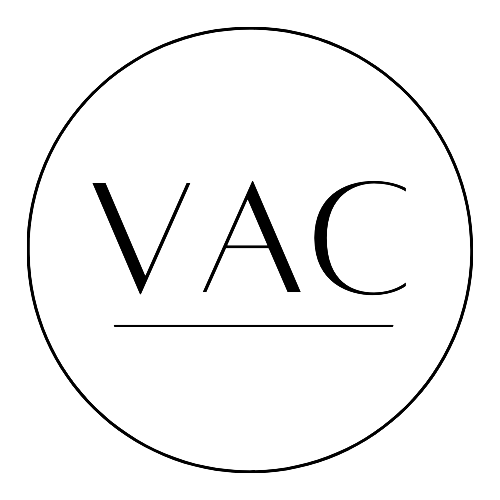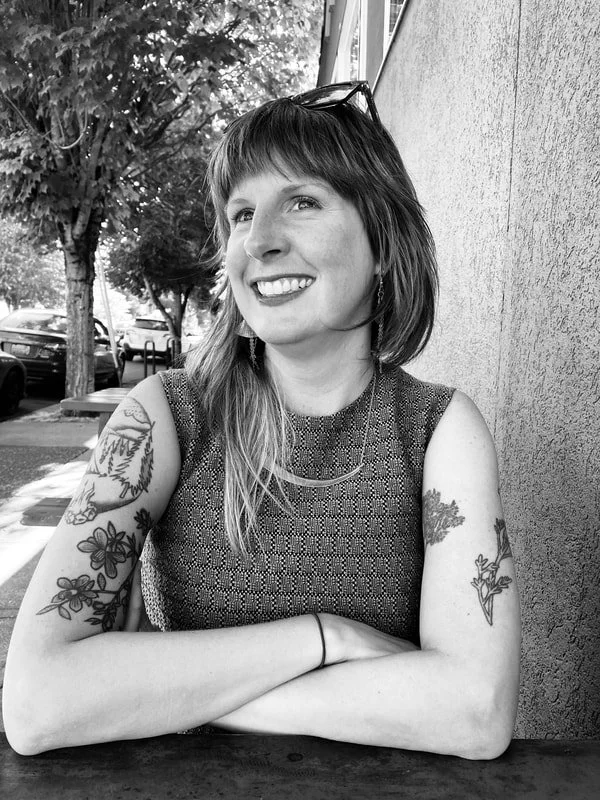Michelle Ramin: Letting Go
Hailing from the mountains of North Central Pennsylvania, Michelle Ramin received her BA from Penn State University and her MFA from the San Francisco Art Institute. She currently lives and works in Los Angeles, CA, and is Assistant Professor of Art and the Curator & Director of Norco College Art Gallery at Norco College. After experiencing years filled with constant Zoom calls, mobile news alerts, social media notifications, and the persistent presence of open laptop windows, Ramin made a deliberate choice to reconnect with colored pencil drawing—the medium that evokes feelings of comfort, stability, and childhood wonder. Creating compositions that depict her observed reality through fragmented yet contained, overlapping boxes has evolved into a meditative practice. Building this visual journal serves as a means to process and analyze the world before her, even amidst its apparent disjointedness.
How did your creative journey begin?
I think I've always been a creative person. I remember sitting with my grandmother as a small kid and drawing with her for hours. She would buy me a color pencil for every "A" I got on my report card (hence my lifelong love and use of color pencils!). They felt like candies or gems - such little precious vibrant gifts that guaranteed to turn me into a heart-eye emoji every time. As I got older, I continued to lean into drawing and painting, in particular. Art always gave me an outlet to sit quietly by myself - to think and focus intensely, and to escape into a world all of my own. It was the thing that I felt most connected to because it was something I was good at AND something that I loved to do - a sort of difficult combo to achieve, even now.
Where do you find inspiration for your work?
I find inspiration everywhere. I know that sounds kinda cliché, but truly I do. Everything I see, everything I read, smell, taste - every conversation, news story, book, record, artwork, travel experience, etc. - they're all potential fodder for new pieces and new bodies of work. My most recent body of work with these layered laptop windows is a series of collaged images from my everyday life - they represent a smattering of things I've seen, read, or experienced recently, assembled together to create a sort of journal entry - a snapshot of my thoughts, connecting various pieces together into one overwhelming image (not dissimilar to how it feels to be inside my brain at any given moment). I'm actually responding to this interview from Corsica, France with an epic view of the Mediterranean - I'm sure this experience will make its way into future artworks somehow, even if it's just the color palette of an alleyway or a random photo I took of a television screen at a bar.
I also love looking at contemporary art. I came to Europe on this trip specifically to see the Venice Biennale (which is stunning and incredibly profound this year - everyone should see it!) to gain more inspiration for my own artwork and to bring some of the art world's ongoing dialogues back to my classroom. My lectures are infinitely more fun (for myself, and hopefully for my students! Hi, students!) when I'm excited about the work I'm presenting - it's a win-win really.
How has your work evolved over the last few years?
In the last few years, I've returned to working on paper and using color pencil as my main medium. There were a couple years leading up to the pandemic where I was getting really into oils and getting more loose and expressive with my paintings, pushing into abstraction. But since about 2021 or 22, I've made a pretty solid return to drawing and representation. I learned a lot about letting go during those years with a more painterly approach, something I feel I really needed. These "letting go" lessons I've been trying to incorporate a bit more into my more controlled color pencil pieces. It's working-ish; I can get really obsessed with perfectionism and with the pencils, I can make things look photorealistic if I want to. But is it worth it at the end of the day? How does that perfectionism help the concept of the piece? My work is so much about my own humanness and my own anxiety as a human living today; my life, and life in general, is messy. Why wouldn't I choose to represent my life with that wonkiness intentionally incorporated? Anyway - I'm working on it, especially the letting go part.
What does a typical day in the studio look like for you, and how has your art practice grown or changed?
My studio is pretty small these days - just a little alcove off my living room with a drawing table - so I've had to adapt a bit from the larger spaces I've had in the past (the difference in space accessibility between Portland, Oregon and Los Angeles is VAST!). On the days I get to spend in my studio in between teaching art to my amazing college students and directing & curating my college's gallery, I wake up, get myself a cup of coffee, read the headline articles in the New York Times, maybe read a couple chapters of a book, and ease into the day. Maybe I'll spend a bit of time in my lovely backyard with my cat and maybe make myself some breakfast before I head into my alcove studio. I typically spend about 6 hours straight drawing (I have a very difficult time taking breaks - once I'm locked into a piece, I'm there until my hand cramps up or my kind husband reminds me I haven't stood up or drank a sip of water in hours.) before I end my session for the day. I listen to music the whole time I'm drawing - it helps to ground me as I'm going, and keeps me in a sort of out-of-body meditative state where time doesn't really exist. This is how my days in the studio have always been - I'm a pretty 9-5 kind of artist and like to be finished in time for dinner, and to maybe go out with friends in the evening, or to go see an indie or punk show at a small indie venue.
Which experiences have impacted your work as an artist?
Wow - so many! Everything impacts me - I am who I am because of my experiences. Maybe some of the most significant impacts are my education and my travels. Receiving my MFA from the San Francisco Art Institute and working with all of my mentors and peers there really helped to progress my art career, and many of them still are in a lot of ways. Like I mentioned earlier, traveling has a huge impact on me - I try to travel to see art whenever I can, important shows and exhibitions in NYC, London, Paris (I just saw a Nicole Eisenman exhibition at Hauser & Wirth in Paris - I sought that show out specifically, and I'm so glad I did!) - I try my best to get to as many of them as possible. I live in Los Angeles now, so these important shows often come to me, which is an amazing benefit of living here. I've also lived in a lot of cities - Portland, San Francisco, now L.A., these moves have really impacted me and my practice as well.
How has social media impacted your work?
It's a blessing and a curse, for sure. I think Instagram, in particular, helps me to stay in contact with so many people and galleries in my network. I keep up-to-date with artists and shows through this platform, and I get to post my own work on there as well. I think it's not quite as powerful as it used to be - I remember the "likes" would just flow in when I'd post a new piece. Now, I'm at the mercy of whatever the algorithm decides. Not nearly as diplomatic or equitable as it used to be, but I think it can still help in terms of marketing. I kinda wish we could all just move away from our reliance on it, but that's another conversation for another interview.
Can you share more about the themes or concepts that you frequently explore in your work?
In my work, I generally try to respond to what's happening in the world around me. The past few years, I've been exploring my relationship with the digital realm, for example, especially as it has changed since the beginning of the pandemic. Since 2020, my digital and physical worlds have sort of melted together - layered screens upon screens, windows upon windows, Zoom session after Zoom session. As I sit in my hotel room right now, I can visibly see 5 screens - two iPhones, two laptops, and a television mounted to the wall. That's a lot of screens! I'm responding to this interview, my husband is on a work call, I'm intermittently texting with an old friend from high school, and we just semi-watched France win against Belgium in a Euro 2024 soccer final - a regular evening in our household, even while traveling.
The multi-tasking expected of us as humans in 2024 is just astounding, and I'm constantly feeling overwhelmed by it, as I know many folx are. Beyond these ideas, I often also deal with concepts related to the self-portrait, personal identity, art history, feminism, contemporary socio-political topics, pop culture, and the everyday.
Website: www.michelleramin.com
Instagram: @michelleramin








